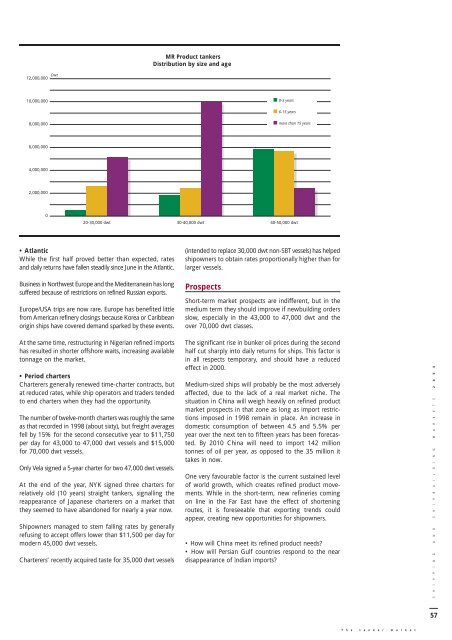You also want an ePaper? Increase the reach of your titles
YUMPU automatically turns print PDFs into web optimized ePapers that Google loves.
Dwt<br />
12,000,000<br />
10,000,000<br />
8,000,000<br />
6,000,000<br />
4,000,000<br />
2,000,000<br />
0<br />
• Atlantic<br />
While the first half proved better than expected, rates<br />
and daily returns have fallen steadily since June in the Atlantic.<br />
Business in Northwest Europe and the Mediterranean has long<br />
suffered because of restrictions on refined Russian exports.<br />
Europe/USA trips are now rare. Europe has benefited little<br />
from American refinery closings because Korea or Caribbean<br />
origin ships have covered demand sparked by these events.<br />
At the same time, restructuring in Nigerian refined imports<br />
has resulted in shorter offshore waits, increasing available<br />
<strong>to</strong>nnage on the market.<br />
• Period charters<br />
Charterers generally renewed time-charter contracts, but<br />
at reduced rates, while ship opera<strong>to</strong>rs and traders tended<br />
<strong>to</strong> end charters when they had the opportunity.<br />
The number of twelve-month charters was roughly the same<br />
as that recorded in 1998 (about sixty), but freight averages<br />
fell by 15% for the second consecutive year <strong>to</strong> $11,750<br />
per day for 43,000 <strong>to</strong> 47,000 dwt vessels and $15,000<br />
for 70,000 dwt vessels.<br />
Only Vela signed a 5-year charter for two 47,000 dwt vessels.<br />
At the end of the year, NYK signed three charters for<br />
relatively old (10 years) straight tankers, signalling the<br />
reappearance of Japanese charterers on a market that<br />
they seemed <strong>to</strong> have abandoned for nearly a year now.<br />
Shipowners managed <strong>to</strong> stem falling rates by generally<br />
refusing <strong>to</strong> accept offers lower than $11,500 per day for<br />
modern 45,000 dwt vessels.<br />
Charterers’ recently acquired taste for 35,000 dwt vessels<br />
MR Product tankers<br />
Distribution by size and age<br />
(intended <strong>to</strong> replace 30,000 dwt non-SBT vessels) has helped<br />
shipowners <strong>to</strong> obtain rates proportionally higher than for<br />
larger vessels.<br />
Prospects<br />
0-5 years<br />
6-15 years<br />
more than 15 years<br />
20-30,000 dwt 30-40,000 dwt 40-50,000 dwt<br />
Short-term market prospects are indifferent, but in the<br />
medium term they should improve if newbuilding <strong>orders</strong><br />
slow, especially in the 43,000 <strong>to</strong> 47,000 dwt and the<br />
over 70,000 dwt classes.<br />
The significant rise in bunker oil prices during the second<br />
half cut sharply in<strong>to</strong> daily returns for ships. This fac<strong>to</strong>r is<br />
in all respects temporary, and should have a reduced<br />
effect in 2000.<br />
Medium-sized ships will probably be the most adversely<br />
affected, due <strong>to</strong> the lack of a real market niche. The<br />
situation in China will weigh heavily on refined product<br />
market prospects in that zone as long as import restrictions<br />
imposed in 1998 remain in place. An increase in<br />
domestic consumption of between 4.5 and 5.5% per<br />
year over the next ten <strong>to</strong> fifteen years has been forecasted.<br />
By 2010 China will need <strong>to</strong> import 142 million<br />
<strong>to</strong>nnes of oil per year, as opposed <strong>to</strong> the 35 million it<br />
takes in now.<br />
One very favourable fac<strong>to</strong>r is the current sustained level<br />
of world growth, which creates refined product movements.<br />
While in the short-term, new refineries coming<br />
on line in the Far East have the effect of shortening<br />
routes, it is foreseeable that exporting trends could<br />
appear, creating new opportunities for shipowners.<br />
• How will China meet its refined product needs?<br />
• How will Persian Gulf countries respond <strong>to</strong> the near<br />
disappearance of Indian imports?<br />
T h e t a n k e r m a r k e t<br />
S H I P P I N G A N D S H I P B U I L D I N G M A R K E T S 2 0 0 0<br />
57


